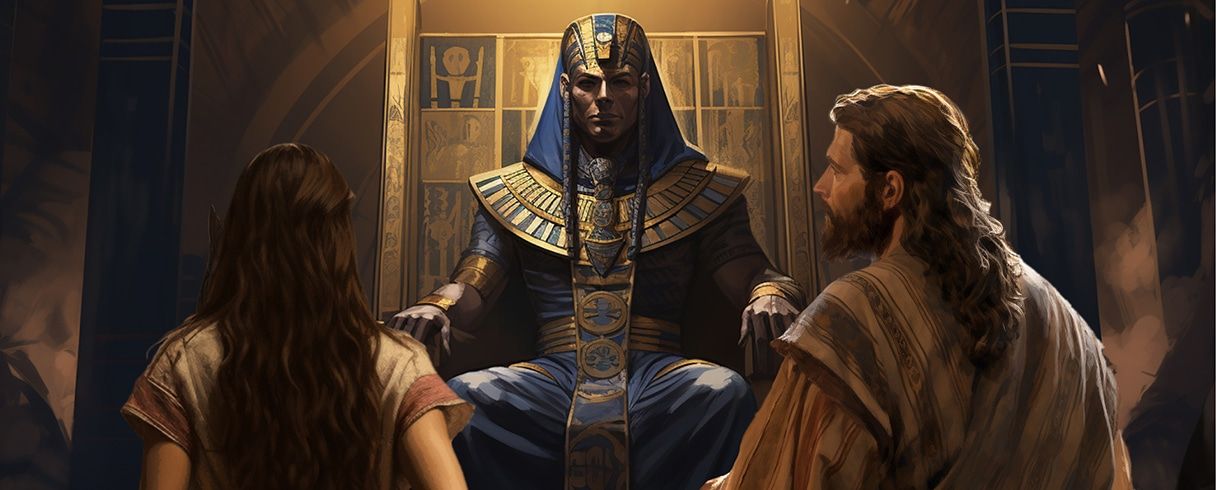The Abrahamic Covenant: Obedience and Faithfulness

FIFTH IN A SERIES
In the preceding four issues, my column has been devoted to the major theological and doctrinal matters involving Abraham, especially the Abrahamic Covenant and its bearing on the Jewish people and the land of Israel. Jesus and Paul are definitely central figures in the Bible, but so is Abraham. He teaches us much about grace, and faith that justifies.
In this fifth and last column, I want to focus on Abraham: his life and his testimony. What are some of the issues he faced, how did he handle them, and what personal application can we make from his life?
The Obedience of Faith in Ur (Gen. 12:1, 4)
“Now the Lord had said unto Abram,” we read in Gen. 12:1, “Get thee out of thy country, and from thy kindred, and from thy father’s house, unto a land that I will shew thee.” “So Abram departed, as the Lord had spoken unto him” (vs. 4).
In our highly mobile society, moving is just a fact of life. People get jobs in different cities, go to a college or university in another state, and are used to packing bags and moving. In the ancient world, that was not at all true. Abram was called to leave his hometown, his family, and his father’s home. Where was he going? What was the destination? “Unto a land that I will shew thee.”
Most people like to have God’s plan for their lives laid out upfront. “You want me to move where? What’s the weather like? Is there a good golf course nearby, and what about ski slopes in the winter?” But the most important thing is not that we know all of God’s will for us, but that we are obedient to what we do know, as was Abram.
Abram in Egypt (Gen. 12:10–20)
After Abram and Sarai obediently went to the land of Canaan, the land of Canaan was impacted by a serious famine. Before we get deeper into this, there is a lesson right here: Following God’s instructions and living in obedience to Him does not mean that life will be easy.
I’m sure we can all relate. We have lived an obedient life, made godly choices, and then find that we do not receive the promotion we were promised, and the increase in salary that we had earnestly hoped for. You’ve heard that the boss thinks you are a “religious fanatic.”
As they approach Egypt, Abram tells Sarai, his wife, “Say, I pray thee, thou art my sister: that it may be well with me for thy sake; and my soul shall live because of thee” (12:13). Sarai, though 65 at this time (see vs. 4), was a beautiful woman. Evidently, these Egyptians knew that the relationship between a man and his wife is “sacred.” A man will fight to preserve the relationship. Therefore, Abram reasoned, he had to remove himself from the picture. “I am only her brother.” They would take Sarai and leave him alone. Maybe Pharaoh would add Sarai to his harem.
Pharaoh took Sarai into his home and treated Abram well for Sarai’s sake. It looked like everything was going to work out; but “the Lord plagued Pharaoh and his house with great plagues because of Sarai Abram’s wife” (vs. 17). But Pharaoh was very unhappy with Abram. “Why saidst thou, She is my sister? so I might have taken her to me to wife: now therefore behold thy wife, take her, and go thy way” (vs. 19).
This is a rebuke to Abram. Pharaoh’s question humiliated Abram. At that moment, the Egyptian monarch behaved with more integrity than Abram, “father of nations.” Have we not all been in situations where non-believers behave with more integrity than believers?
Julius, the Roman centurion, was a pagan, but he treated an important prisoner, the Apostle Paul, kindly on the voyage to Rome and allowed the apostle to go and see friends for encouragement (Acts 27:3). Julius also prevented his men on the sinking ship from following military procedure, which mandated the execution of prisoners on a sinking ship lest they escape (Acts 27:42–43).
Abram Defers to Lot (Gen. 13:8)
In Genesis 13:8, we read, “And Abram said unto Lot, Let there be no strife, I pray thee, between me and thee, and between my herdmen and thy herdmen; for we be brethren.” The issue had to do with grazing rights. In modern language, Abram said to Lot, “The whole countryside is available to you. Take your choice of what you think is the best grazing land. If you want the land on the left, I’ll take the land on the right. If you think the land on the right is better, they I’ll go to the left” (paraphrase of vs. 9).
Remember, Abram is well-known, has lots of possessions, and even has a private army, but Abram is deferring to Lot, his nephew. Lot took a look at the fertile plains of the Jordan Valley and saw that the whole area was well-watered. That’s the area that Lot chose.
Maintaining peace and good relations may entail surrendering our rights, even as Jesus did in Philippians 2:5. Family ties are important, but all too often strife erupts within a family. Families are supposed to be citadels of peace and acceptance. A breakdown in family ties destroys this very vital and basic purpose of families. Abram has set a good example for all of us.
Abram: A Man of Courage and Devotion to God (Gen. 14:14)
Sometimes we think that men and women of faith are pushovers. Of course, there are such people who are pushovers. We need to remind them, “If you won’t stand for something, you will fall for anything.” But Abram was a man of faith, and also a man of courage.
In Genesis 14 we read of an invasion led by Chedorlaomer and a coalition totaling four kings, who made war with Bera, king of Sodom, and his coalition of five kings. The invaders were fierce warriors, winning over the local kings. “And they took all the goods of Sodom and Gomorrah, and all their victuals, and went their way. And they took Lot, Abram’s brother’s son, who dwelt in Sodom, and his goods, and departed” (vss. 11–12).
Abram, a man of faith and courage, led his personal army of 318 men and rescued Lot (vss. 14-16). Abram certainly lived by faith, but he realized, as we all should, that faith does not make us passive in the face of evil. I’ve heard that in the early years of America’s founding, generals would tell their men, as they went into battle, “Trust the Lord—and keep your powder dry.”
We must all admire Abram, but in this same chapter, we see that Abram puts the honor of God at the top of his list. The king of Sodom, in an evident good gesture to Abram, offered Abram the goods that had been taken. Abram refused. If he received goods from the king of Sodom, he would have allowed the king to attribute Abram’s successes and wealth to the king’s generosity instead of the Lord’s goodness (vss. 22–23).
This reminds me of the Apostle Paul’s words in 1 Corinthians 15:10: “But by the grace of God I am what I am: and his grace which was bestowed upon me was not in vain; but I laboured more abundantly than they all: yet not I, but the grace of God which was with me.”
Abram’s Love for Ishmael (Gen. 17:18)
Most Christians, and even non-Christians, don’t quite know what to think of Ishmael, Abraham’s first son. “Wasn’t he the father of Islamic terrorists?” some might ask. Abraham clearly knew God’s plan for his second son, Isaac (17:19). The line of God’s covenant would be carried through him. The Hebrew patriarchs include Abraham, Isaac, and Jacob. Yet, in Genesis 17:18 Abraham cries out to God, “O that Ishmael might live before thee!” Even as Abraham could not forget Ishmael, neither will the Bible allow us to forget Ishmael.
In Genesis 16 Sarai recommended Abram follow what was accepted practice, to father a son by a surrogate. In this case, it was Sarai’s Egyptian servant, Hagar. When Hagar became pregnant, the conflict between the two women could not be ignored. Hagar did not help the situation (Gen. 16:4). This pregnant Egyptian woman fled into the desert (vs. 6).
But God was not done with Hagar and her son. The angel of the Lord “found” Hagar (vs. 7). The angel’s advice to Hagar was to return to Sarai and submit to her (see vs. 9). Hagar, I am sure, found that to be a most unpleasant command. The angel followed that with amazing news: “I will multiply thy seed exceedingly, that it shall not be numbered for multitude” (vs. 10).
If we fast forward to Genesis 21, we see that Ishmael has grown and upsets Sarah because he is mocking Isaac (vs. 9). Sarah tells Abraham, “Cast out this bondwoman and her son” (vs. 10). “And the thing was very grievous in Abraham’s sight because of his son” (vs. 11). God tells Abraham not to be upset. He has a plan for Isaac. But then Abraham receives consolation from the Lord, “And also of the son of the bondwoman will I make a nation, because he is thy seed” (vs. 13). God loves Ishmael because he is a descendant of Abraham, just as He brought blessings to Potiphar’s house because He loved Joseph (Gen. 39:5).
Much more could be written about Ishmael, but we want to notice that Abraham passes away at the age of 175. “And his sons Isaac and Ishmael buried him in the cave of Machpelah” (Gen. 25:9). Is this a small token of God’s plans for Jews and Arabs to come together at some future time, brought together by the love of the Jewish Messiah, Jesus? I believe it is, but that’s another story.
God is faithful. He has not forgotten His promises to Abraham.




Leave a Reply